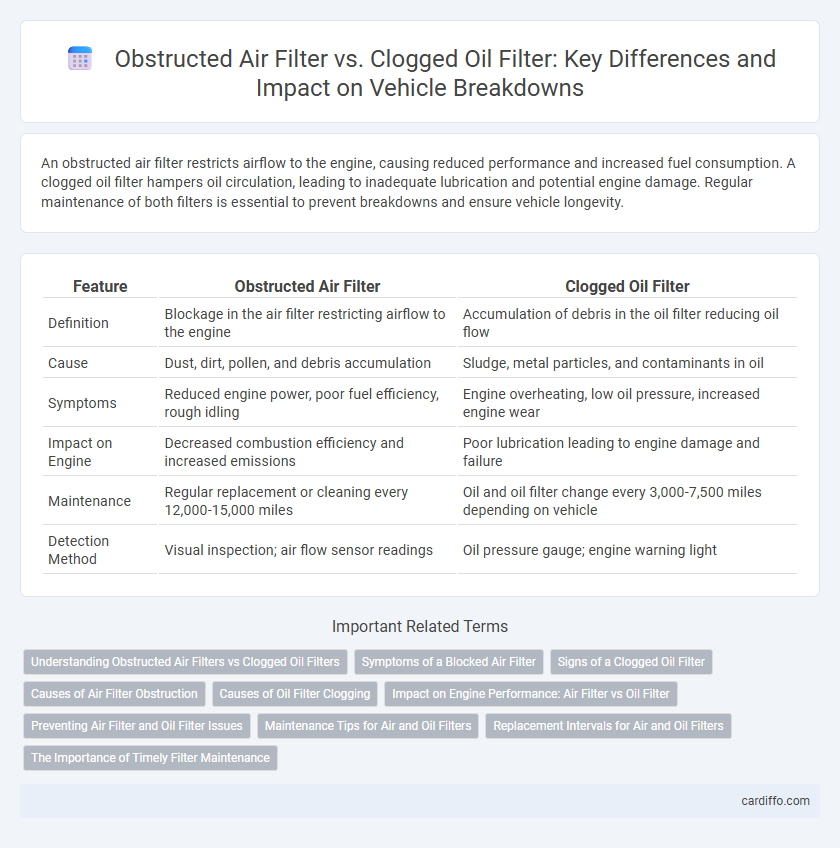An obstructed air filter restricts airflow to the engine, causing reduced performance and increased fuel consumption. A clogged oil filter hampers oil circulation, leading to inadequate lubrication and potential engine damage. Regular maintenance of both filters is essential to prevent breakdowns and ensure vehicle longevity.
Table of Comparison
| Feature | Obstructed Air Filter | Clogged Oil Filter |
|---|---|---|
| Definition | Blockage in the air filter restricting airflow to the engine | Accumulation of debris in the oil filter reducing oil flow |
| Cause | Dust, dirt, pollen, and debris accumulation | Sludge, metal particles, and contaminants in oil |
| Symptoms | Reduced engine power, poor fuel efficiency, rough idling | Engine overheating, low oil pressure, increased engine wear |
| Impact on Engine | Decreased combustion efficiency and increased emissions | Poor lubrication leading to engine damage and failure |
| Maintenance | Regular replacement or cleaning every 12,000-15,000 miles | Oil and oil filter change every 3,000-7,500 miles depending on vehicle |
| Detection Method | Visual inspection; air flow sensor readings | Oil pressure gauge; engine warning light |
Understanding Obstructed Air Filters vs Clogged Oil Filters
Obstructed air filters restrict airflow to the engine, causing reduced fuel efficiency and power loss, while clogged oil filters impede oil flow, leading to increased engine wear and potential overheating. The air filter's primary role is to prevent dirt and debris from entering the combustion chamber, whereas the oil filter removes contaminants from engine oil to ensure proper lubrication. Regular maintenance schedules recommend replacing air filters every 12,000 to 15,000 miles and oil filters with each oil change to maintain optimal engine performance and longevity.
Symptoms of a Blocked Air Filter
A blocked air filter causes symptoms such as reduced engine power, rough idling, and increased fuel consumption due to insufficient airflow entering the engine. Engine misfires and black smoke from the exhaust are common signs indicating restricted air supply. Unlike a clogged oil filter, which primarily leads to oil pressure issues, a blocked air filter directly impairs combustion efficiency and engine performance.
Signs of a Clogged Oil Filter
Signs of a clogged oil filter include reduced engine performance, increased engine noise, and dark exhaust smoke. Oil pressure warning lights may illuminate on the dashboard, indicating restricted oil flow. Regular inspection and timely replacement of the oil filter are crucial to prevent engine damage and maintain optimal vehicle performance.
Causes of Air Filter Obstruction
Air filter obstruction primarily results from the accumulation of dust, dirt, pollen, and other airborne contaminants that block airflow into the engine. Environmental factors like driving in dusty or sandy conditions and infrequent maintenance schedules accelerate this buildup, reducing engine efficiency. Unlike a clogged oil filter that traps sludge and metal particles from engine oil, an obstructed air filter directly impairs the combustion process by restricting essential oxygen intake.
Causes of Oil Filter Clogging
Oil filter clogging primarily occurs due to the accumulation of contaminants such as dirt, metal particles, and sludge within the engine oil. Inadequate oil changes and poor-quality oil accelerate the buildup of debris, reducing the filter's efficiency. Unlike obstructed air filters which block airflow, clogged oil filters restrict oil flow, leading to engine wear and potential breakdown.
Impact on Engine Performance: Air Filter vs Oil Filter
An obstructed air filter restricts airflow to the engine, reducing combustion efficiency and causing decreased power and fuel economy. A clogged oil filter impedes oil circulation, leading to inadequate lubrication, increased engine wear, and potential overheating. Both filters critically impact engine performance, but while the air filter primarily affects air intake and combustion, the oil filter directly influences engine protection and longevity.
Preventing Air Filter and Oil Filter Issues
Regularly inspecting and replacing air filters ensures optimal airflow and engine performance, preventing obstruction-related breakdowns. Maintaining a clean oil filter is crucial to avoid contamination that can cause engine wear and reduce lubrication efficiency. Implementing a routine maintenance schedule with quality filters significantly reduces the risk of filtration issues and prolongs vehicle lifespan.
Maintenance Tips for Air and Oil Filters
Regularly inspect and replace the air filter every 12,000 to 15,000 miles to prevent obstruction from dust and debris that can reduce engine efficiency. Oil filters should be changed with every oil change, typically every 3,000 to 5,000 miles, to avoid clogging that restricts oil flow and causes engine wear. Maintaining clean air and oil filters ensures optimal engine performance, fuel efficiency, and longevity.
Replacement Intervals for Air and Oil Filters
Obstructed air filters typically require replacement every 12,000 to 15,000 miles, as they directly affect engine performance and fuel efficiency by limiting airflow. Clogged oil filters should be replaced more frequently, often every 3,000 to 7,500 miles depending on vehicle type and oil used, to ensure proper lubrication and prevent engine wear. Adhering to these replacement intervals helps maintain optimal engine health and avoids potential breakdowns caused by filter issues.
The Importance of Timely Filter Maintenance
Timely maintenance of air and oil filters is crucial to prevent engine breakdowns and ensure optimal performance. An obstructed air filter restricts airflow, reducing fuel efficiency and power, while a clogged oil filter impairs oil circulation, risking engine overheating and wear. Regular inspections and replacements of these filters protect engine components, extend vehicle lifespan, and reduce costly repairs.
Obstructed air filter vs clogged oil filter Infographic

 cardiffo.com
cardiffo.com